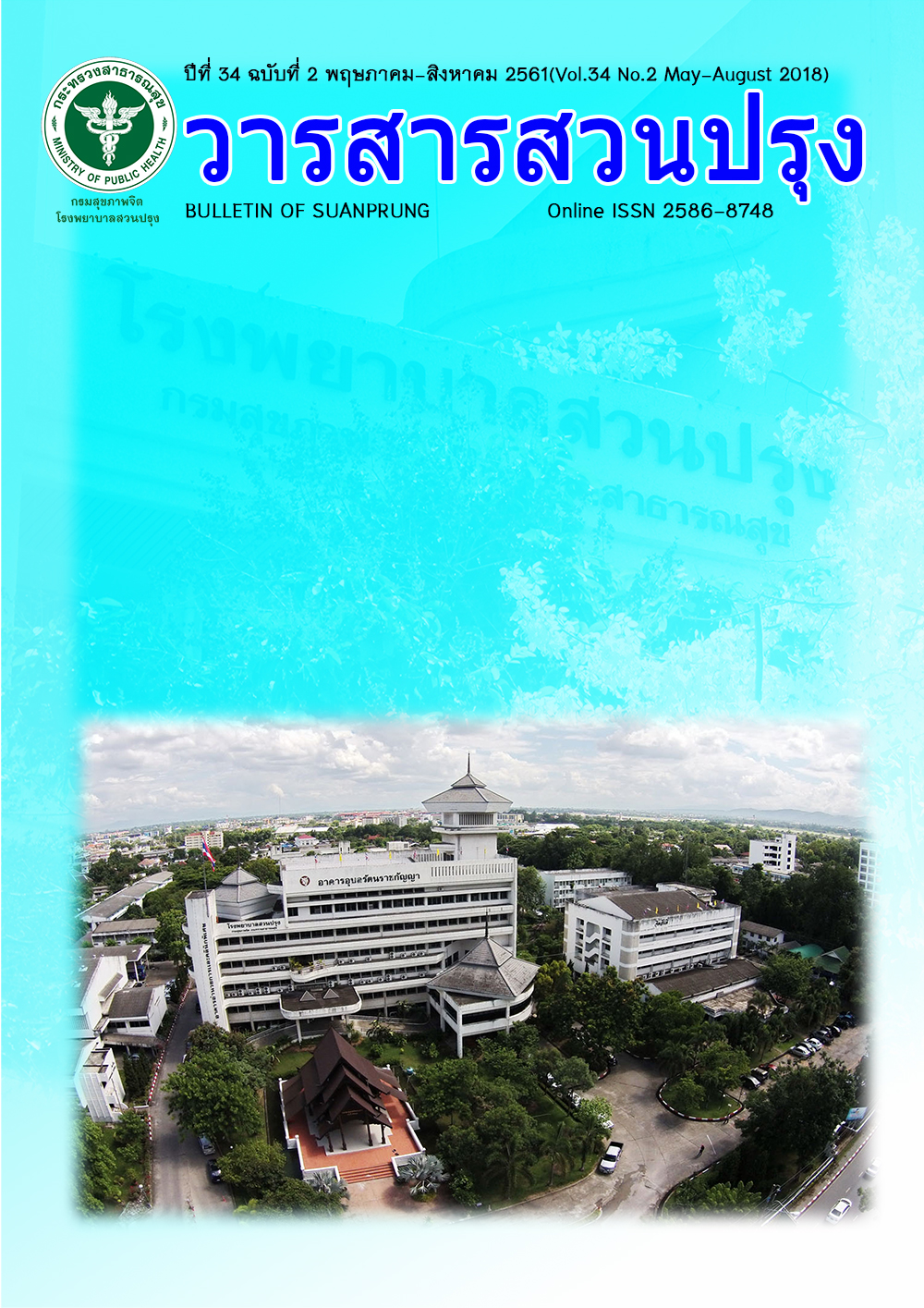Effectiveness of the Community Living Skills Program in Adolescents with Autism Spectrum Disorders
Main Article Content
Abstract
Abstract
Objectve: To study the effectiveness of the community living skills program based on Occupation-Based Practice (OBP) in adolescents with Autism Spectrum Disorders (ASD).
Materials and methods: A case study research design with purposive sampling was used in this study. Three participants aged between 18 to 25 years were selected to receive the community living skills programme based on OBP. The length of the programme was a one-hour session, twice a week for 10 weeks. Data were collected for a period of 5 months from August to December 2016. The Canadian Occupational Performance Measure (COPM) and Goal Attainment Scaling (GAS) were used to assess the outcomes. Data were analyzed by using descriptive statistics.
Results: A participant withdrew from the study. For the two case studies left, the results showed that the adolescents and their parents identified group presentation and brushing teeth as the most important occupation. Important community living skills required for these two activities were self-awareness, communication, interpersonal relationships, decision-making, problem solving, critical thinking, and empathy. After the intervention program, the participants rated satisfaction and performance scores of COPM higher than those prior to the intervention. All aspects of the required community living skills were improved. Average GAS T-scores changed dramatically from 21.64 to 50.64 (the percentage change was 134.01%)
Conclusions: The community living skills program, based on OBP, may enhance community living skills and also increase occupation performance and satisfaction in adolescents with ASD.
Keywords: Occupation-based practice, Community living skills, Adolescent, Autism spectrum disorders
ผลของโปรแกรมการฝึกทักษะชีวิตในชุมชนของวัยรุ่นออทิสติกสเปกตรัม
บทคัดย่อ
วัตถุประสงค์: ศึกษาผลของโปรแกรมการฝึกทักษะชีวิตในชุมชนตามแนวทาง Occupation-Based Practice (OBP) ในวัยรุ่นออทิสติกสเปกตรัม
วัสดุและวิธีการ: งานวิจัยแบบกรณีศึกษา คัดเลือกแบบเฉพาะเจาะจงเลือกวัยรุ่นออทิสติกสเปกตรัมอายุ 18-25 ปี 3 คน เข้าโปรแกรมฯ 20 ครั้ง สัปดาห์ละ 2 ครั้ง ครั้งละ 1 ชม. ทำการเก็บข้อมูลเป็นระยะเวลา 5 เดือน ตั้งแต่เดือนสิงหาคม-ธันวาคม พ.ศ. 2559 ประเมินโดยแบบประเมิน The Canadian Occupational Performance Measure (COPM) และเกณฑ์การกำหนดเป้าหมายตามหลักการ Goal Attainment Scaling (GAS) เปรียบเทียบผลการประเมินก่อนและหลังการเข้าโปรแกรมโดยใช้สถิติเชิงพรรณา
ผลการศึกษา: กรณีศึกษา 1 คนถอนตัวหลังเข้ารับโปรแกรม 17 ครั้ง ปัญหาในการทำกิจกรรมการดำเนินชีวิตที่ผู้ปกครองและวัยรุ่นออทิสติกสเปกตรัมต้องการแก้ไขมากที่สุด ได้แก่ การนำเสนองานหน้าชั้นเรียนเป็นกลุ่ม และการแปรงฟัน การทำกิจกรรมดังกล่าวต้องอาศัยทักษะชีวิตในชุมชนที่สำคัญ ได้แก่ การตระหนักรู้ตนเอง การสื่อสาร การสร้างสัมพันธภาพ การตัดสินใจ การแก้ไขปัญหา ความคิดวิเคราะห์วิจารณ์ และความเห็นใจผู้อื่น หลังการเข้ารับโปรแกรมฯ พบว่า กรณีศึกษาทั้ง 2 คนมีความสามารถและความพึงพอใจในการทำกิจกรรมการดำเนินชีวิตเพิ่มขึ้น และมีคะแนนความสามารถของทักษะชีวิตเพิ่มขึ้นในทุกๆ ด้าน โดยมีค่าเฉลี่ยทักษะชีวิตโดยรวมเพิ่มขึ้นจาก 21.64 เป็น 50.64 คิดเป็นร้อยละที่เพิ่มขึ้นเท่ากับ 134.01
สรุป: โปรแกรมการฝึกทักษะชีวิตในชุมชนตามแนวทาง OBP อาจช่วยให้กรณีศึกษาวัยรุ่นออทิสติกสเปกตรัมมีทักษะชีวิตในชุมชนเพิ่มขึ้น มีความสามารถและความพึงพอใจในประกอบกิจกรรมในการดำเนินชีวิตดีขึ้น
คำสำคัญ: Occupation-based practice, ทักษะชีวิตในชุมชน, วัยรุ่น, ออทิสติกสเปกตรัม
Article Details
บทความหลังผ่านการปรับแก้จากกองบรรณาธิการแล้ว เป็นลิขสิทธ์ของวารสารจิตเวชวิทยาสาร โรงพยาบาลสวนปรุง กรมสุขภาพจิต กระทรวงสาธารณสุข ห้ามเผยแพร่เพื่อประโยชน์ทางการค้าโดยไม่ได้รับอนุญาต แต่อนุญาตให้เผยแพร่บทความดังกล่าวเพื่อประโยชน์ทางการศึกษาแก่ประชาชนทั่วไป ทั้งนี้กองบรรณาธิการไม่จำเป็นต้องเห็นด้วยกับบทความหรือข้อคิดเห็นใดๆ ที่ปรากฏในวารสารสวนปรุง

